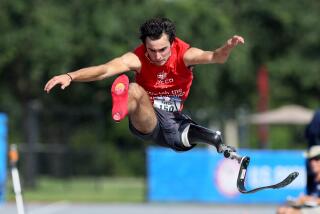A Special Olympian Proves He Can
- Share via
. . . (He) turned his head and grinned and pointed and there, ahead, all he could see, as wide as all the world, great, high, and unbelievably white in the sun, was the square top of Kilimanjaro. And then he knew that there was where he was going.
--Ernest Hemingway, “The Snows of Kilimanjaro”
Jeffrey Scott struggled to make sense of his climb to the top of Kilimanjaro, the highest mountain in Africa. The challenge, after all, was not so much the hardship but to overcome his handicap. “It made me feel special,” he said, after some thought. “I think it sent a message to all the other athletes that they can do something like this, too.”
Jeff’s sojourn was in many ways a metaphor for the struggles he and others like him have had to endure throughout their lives. As members of the misunderstood world of the mentally disabled, Jeff, 21, and 12 other Special Olympians who made the journey carried more than just backpacks on their shoulders.
“These athletes proved to the world that they don’t have to be feared or tossed aside,” said trip organizer Jim Benson, a California Special Olympics board member. “With guidance and encouragement, these people are capable of doing just about anything.”
The 34-member Special Olympics party spent 30 days in Africa on a privately funded trip that included, among other experiences, a hot air balloon safari and a convergence, of sorts, with athletes from the Kenya Special Olympics program.
But it was the climb to the summit of Mt. Kilimanjaro that helped raise funds for the Special Olympics program and lift the spirits of those who braved the exposure to nature and, potentially, personal failure.
For many of the athletes, it was the first time they had been away from the comfort and security of home.
“Jeff’s father and I thought about going along on the trip, but we decided against it,” said Roseann Scott, Jeff’s mother. “It was an opportunity for Jeff to be on his own, without his parents.”
Jeff was diagnosed in first grade as “educable mentally retarded,” according to his mother--although he favors the word slow. Essentially, Jeff has a limited learning ability.
“In certain instances, he had a hard time understanding,” explained Jeff’s twin sister, Cynthia. “But he’s a lot smarter than he lets people believe. And he knows how to use it to his advantage.”
But what distinguished him from the other athletes on the trip to Africa was his prowess. Since graduating from Valencia High School, where he lettered in cross country and track, Jeff has excelled in team sports with the Special Olympics program. To qualify for Kilimanjaro, the athletes had to scale Mt. San Jacinto, near Hemet. Jeff described it as a piece of cake.
“If it wasn’t for his mental disability, Jeff would probably be a professional athlete,” said his basketball coach Keith Brigman.
Planning for the trip took 15 months. “From the beginning, Jeff had a strong belief in himself and his abilities to succeed,” said Karen Wilson, who coordinated the trip.
In the end, only 10 members of the party (five athletes and five coaches) made it to the top of Kilimanjaro.
At the 16,000-foot mark, one of Tanzania’s worst snowstorms in 25 years caused all but the most experienced climbers to turn back. “I had heard about the snows of Kilimanjaro, but this was an incredible hardship,” said Matt George, a free-lance photographer who captured images of the trip.
It definitely was a safari with a minimum of comfort. The group was snowbound for three days. The climbers slept in tents.
“Jeff was one of the better athletes and a constant source of inspiration,” recalled Ken Snelling, survival expert and Jeff’s climbing coach. “We hiked as a team. He encouraged me, and I encouraged him.”
They climbed the last 1,000 feet in waist-high slush. “The athletes were in better shape than their coaches,” said Benson, who went along on the trip.
As soon as they had reached the top, Jeff posted an Orange County Special Olympics flag. “I did it for my teammates and the others who did not make it to the top,” he explained.
Meanwhile Jeff’s friends and family were the ones left out in the cold. Communication with the party had been disconnected, due in part to the storm. “We were nervous, but we had confidence in the team leaders,” said Jeff’s mother.
It wasn’t until the following Saturday, when Jeff called home, that they heard he had made it. “I got tears in my eyes,” said Cynthia Scott.
“The first part of the climb was a piece of cake,” Jeff recalls. “But then it got harder, and then it got harder, and then it became a challenge. But it was a good thing because during the climb you could see the clouds and the mountains. It was gorgeous.”
A documentary about the climb will air on television sometime this year, according to Benson. And a book with photographs from the trip is being prepared, proceeds from which will benefit Special Olympics.
Jeff may have lost 10 pounds during the experience, but he gained in other ways. In fact, the climb to the top of Kilimanjaro was only a beginning for him. His goal in life is to become self-supporting.
Explained his father: “Handicapped has a stigma that says ‘No I can’t.’ This climb changed that stigma to ‘Yes I can.’ ”
To that end, Jeff has landed a job at Souplantation in Brea and enrolled in programs at Fullerton College that teach living skills. “This was just a wonderful experience,” said Roseann Scott. “It made people look at these athletes and realize that they can achieve things, too, if they’re given an opportunity.”
More to Read
Go beyond the scoreboard
Get the latest on L.A.'s teams in the daily Sports Report newsletter.
You may occasionally receive promotional content from the Los Angeles Times.







